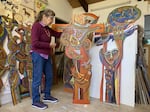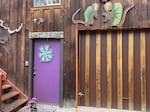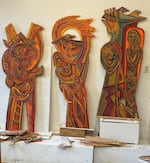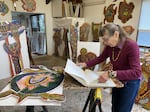
Artist Betty LaDuke in her Ashland studio with some of her wood panel pieces.
Holly Dillemuth / JPR
Betty LaDuke’s art studio and home in the Ashland hills above Southern Oregon University is as unique as she is — an atelier of artistic expression.
“The monkeys will lead you there,” she told me, in email exchanges while arranging the interview. As I approach, I’m greeted by two painted-panel monkeys displayed on the outside of the house.

Monkeys welcome you to Betty LaDuke's home and art studio in Ashland.
Holly Dillemuth / JPR
Seeing me at the door through the glass, LaDuke, 88, springs from her chair behind her office desk. She welcomes me warmly.
LaDuke is animated, pointing out pieces in her home, such as etchings she made in Guatemala, created during her early years of travel.
“My work has been around the world,” LaDuke tells me.
She points out paintings in her living room depicting her travels to Africa and Latin America. The bright, rich colors in her living room match her own vibrancy.
Related: Betty LaDuke reflects on 8 decades of activist art
‘Fire, fury, & resilience’
Walking into her art studio, paint-splotched floor below and sketchbooks and painted panels all around, she directs me to walk in a straight line with her to the other side of the room, before turning around.
Pointing toward the opposite wall, she says, “There’s your fire, your fury, and your resilience.”
Each of the three aptly named wood panels represents the emotions of the Almeda Fire. LaDuke started working on the panels in October 2020, about a month after the fire ravaged the towns of Talent and Phoenix, destroying more than 2,300 homes in just a few hours. She had housed a friend and evacuee from Phoenix who feared the loss of her own home.

Betty LaDuke's wood panel tryptych "Fire, Fury and Resilience," in her Ashland studio in October 2021.
Holly Dillemuth / JPR
The first panel in the series captures the feelings of desperation felt by her friend and so many and the “horror of the flames” that night.
For nine days, while LaDuke’s friend stayed with her following the fire, anxiety over whether her home was still standing was ever-present in LaDuke’s own home.
“We had the skies that were orange … the sirens, the lack of movement,” LaDuke said.
LaDuke’s friend would check her cell phone all throughout the day in the days following the fire to learn when she could return to her home.
“The anxiety, the lack of information, the lack of knowing specifically about her home and the state it would be in,” LaDuke said.
The second panel resulted after LaDuke was able to drive around the Rogue Valley and see for herself the devastation left behind
What she found were charred trees and “the agony of what people had to experience.”
Her friend’s home survived the flames but LaDuke learned of other friends following that day who had lost their homes and some of their artwork.
“Sometimes, people had nothing but each other and their family,” LaDuke says, “but the future was unclear.”
The third panel showcases a sense of regrouping and of people taking care of their animals and one another.
LaDuke was inspired by seeing people reaching out to neighbors and lost animals; she watched as people left dishes of food for lost pets and caring for one another amidst the tragedy of it all.
The works of art also made it on the cover of a book called “Fire, Fear, Hope,” which chronicles the stories of nine women related to the fire.
Roots to branches
Raised in the Bronx in New York City, Betty LaDuke taught at Southern Oregon University for more than 30 years. She has lived in and visited dozens of countries all over the world, but she has kept her influence local, too.
The daughter of a house painter and factory worker, she was always fascinated by public displays of art.
“(My parents) wanted me to make a living, that was a big thing,” she says.
But they also encouraged her interest in art.
In her teen years, she attended The High School of Music and Art in Harlem, now known as the Fiorello H. LaGuardia High School. There her assignments often brought her to marketplaces all over New York City, with a sketchbook in hand. It was there that she formed part of her artistic style and way of seeing the world through her sketchbook.
She traveled to Mexico at 19 and lived there until the age of 23. It was there that she found inspiration from some of the greatest mural painters in the world; a style that included making her art outside of a traditional rectangular canvas.
You quickly notice from a look around her studio that LaDuke doesn’t like rectangles or hard edges and that shows in her art. The wood panels she creates come to life outside of four right angles.
“I just somehow connected with a sense of form,” LaDuke said.
Art drawn from a life fully lived
Much of LaDuke’s work documents the life and work involved in the human experience, from youth to old age, on a local level, but also in countries all over the world; showing how, despite cross-cultural differences, and as Maya Angelou said, “We are more alike ... than we are unalike.”
Animals, people, and agriculture have inspired her work for decades, including 75 panels created to represent farm workers in the region. Some of them were displayed for several years at Medford’s Rogue Valley International Airport.
All of LaDuke’s art is responsive to the world around her - both near and far. She reads and listens to the news and describes her artwork as a mix of humor, satire, realism and hope.

Betty LaDuke looks through some of her many sketchbooks in her studio.
Holly Dillemuth / JPR
It starts with her sketchbook, of which many are stacked high in her art studio.
Social justice then flows through the strokes of her paint brush onto the wooden panels, which she builds herself. Panels in progress and in finished form fill the art studio space. Some depict scenes from the pandemic, The Dream Act, or natural disasters brought on by climate change. Her aim is to capture the spirit and energy of people all over the world.
“It makes the statement of what I see and feel but it invites people to interact and to ask questions, of each other and the work, and me,” LaDuke says.
She also drew some of her agricultural art inspiration from her late husband Peter Westigard, an entomologist at what is now Southern Oregon Research and Extension Center (SOREC). The couple were married 48 years.
They said their vows in 1965, not long after she and her daughter Winona arrived in southern Oregon in 1964.
Winona LaDuke became a well-known activist, and later ran for vice president of the United States on the Green Party ticket with Ralph Nader in 2000.
Youthful, humble spirit
Betty LaDuke’s works have also been displayed throughout the Rogue Valley and around the world. A piece of her art has also been placed in the office of Oregon Gov. Kate Brown and pieces are also located in the office of state Sen. Jeff Golden (D-Ashland).
Despite her acclaim, it’s easy to see that the 88-year-old LaDuke has kept a youthful and humble spirit about her throughout the years.
Her grandchildren’s artwork is prominently displayed as you walk into her studio, even though her grandchildren are long grown.
She has also always continued to depict children all over the world through her art, which has led her to a new project producing coloring books.
LaDuke shares the newly published coloring books around her kitchen table, located only feet from her art studio within her home. The coloring books can be purchased in Ashland and Grants Pass.
LaDuke published the first coloring book after her art sketches were used in conjunction with coloring activity sheets that Rogue Valley Farm to School provided students with during the beginning of the pandemic. The program also provided food boxes through Fry Family Farm to students in Phoenix and Talent throughout the Rogue Valley during the pandemic.
That gave her the idea to create her own coloring book, of which there are now seven in total in publication this year. One features sketches of children all over the world, farm workers, and women.
“It’s like my need to do this at my age in a sense that I don’t want these sketchbooks to get lost in some archival bin,” LaDuke says.
“These sketches need to live,” she adds. “They have a lot to say about people … so that kids can see a bigger picture of the world and how food is harvested.”
New show planned for spring 2022 at Grants Pass Museum of Art
LaDuke’s Almeda Fire panels will be part of a multidimensional art show scheduled for Spring 2022 at Grants Pass Museum of Art. LaDuke has named her 38-panel exhibit “Fire, Fury & Resiliency: Social Justice.”
The themes of the showcase will cover climate change, the COVID-19 pandemic, resilience, border crossings near and far, and the wisdom of turtles.
Hyla Lipson, executive director of the Grants Pass Museum of Art, is working with her on planning the exhibit.
“It’s beautiful art and I find it very hopeful,” Lipson said.
More of Betty LaDuke’s art is at www.bettyladuke.com.